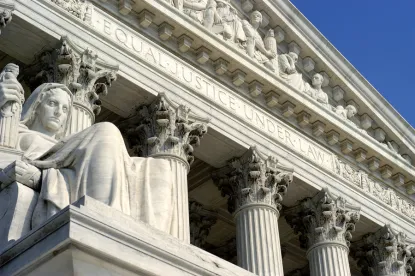The Supreme Court recently granted certiorari in Brownback v. King, agreeing to review a split decision from the Sixth Circuit (then styled King v. US) involving the contours of the Federal Tort Claim Act’s judgment bar. The Court’s decision should help resolve confusion regarding whether plaintiffs should add FTCA claims to their Bivens actions.
28 U.S.C. § 2676 provides that a judgment on an FTCA claim “shall constitute a complete bar to any action by the claimant, by reason of the same subject matter, against the employee of the government whose act or omission gave rise to the claim.”
The Supreme Court recently interpreted the FTCA’s judgment bar: “once a plaintiff receives a judgment (favorable or not) in an FTCA suit, he generally cannot proceed with a suit against an individual employee based on the same underlying facts.” Simmons v. Himmelreich, 136 S. Ct. 1843, 1847 (2016). So Simmons would seem to suggest that an FTCA judgement, whether in the government’s favor or not, would bar a related claim against the individual employees.
But are all “judgments” created equal for FTCA judgment-bar purposes? A Sixth Circuit panel (Clay opinion, Boggs join) didn’t think so. In King, it held that judgments dismissing FTCA claims for lack of subject-matter jurisdiction don’t count as “judgments” for purposes of the FTCA’s judgment bar. To reach that holding, the King court adopted a broad view of what qualifies as a dismissal for lack of subject-matter jurisdiction.
Because “sovereign immunity is jurisdictional in nature,” the court held, a plaintiff’s failure to allege or prove the six(!) elements necessary to establish a waiver of sovereign immunity is not merely a judgment against the plaintiff; it signifies the court lacked subject-matter jurisdiction in the first place. The catch? Deciding whther sovereign immunity has been waived requires determining whether the state-law tort claims would be viable under state law.
In essence, a plaintiff’s failure to satisfy the Meyer test based on underlying state-law tort claims may result in a ruling that the federal government has not waived its sovereign immunity, which may then result in a ruling that the federal court must dismiss for lack of jurisdiction over the claim. Crucially, a dismissal for lack of jurisdiction would fall beyond the FTCA judgment bar and allow the plaintiff to bring a related claim against individual federal government employees.
Judge Rogers’ dissent and the Solicitor General, however, contend this notion of jurisdiction catches far more FTCA judgments than it should. The problem with the majority’s holding, they maintain, is that practically every FTCA judgment in the government’s favor—even merits-based judgments that are intertwined with the sovereign-immunity analysis—would qualify as “dismissals for lack of subject-matter jurisdiction” that don’t trigger the judgment bar. This would water down the judgment bar’s otherwise-preclusive effect for FTCA judgments.
The decision in King may have important implications for parties bringing simultaneous FTCA and Bivens claims. The Court may clarify whether a merits-based FTCA judgment bars Bivens claims based on the same underlying facts, even when the claims are brought in the same action. The Ninth Circuit has held that a merits-based FTCA judgment for the government bars a Bivens claim, but not if the two claims are brought in the same action. See Fazaga v. FBI, 916 F.3d 1202 (9th Cir. 2019). Other circuits have dismissed related Bivens claims upon entry of an FTCA judgment, even when brought in the same action. Unus v. Kane, 565 F.3d 103, 122 (4th Cir. 2009). Indeed, at least one circuit has gone so far as to vacate, post-trial, a Bivens judgment in the plaintiff’s favor because it found that entry of a related FTCA judgment in the government’s favor triggered the FTCA’s judgment bar. See Manning v. United States, 546 F.3d 430, 434 (7th Cir. 2008).
The Supreme Court, for its part, has been reluctant to read the FTCA’s judgment bar in a way that “encourage[s] litigants to file suit against individual employees before suing the United States to avoid being foreclosed from recovery altogether.” In Simmons it held that such a result is at odds with one of the FTCA’s purposes—namely, “channeling liability away from individual employees and toward the United States.” 136 S. Ct. at 1850. The challenge for the Supreme Court may be furthering that stated purpose, while still giving effect to the text of the judgment bar.



 />i
/>i

